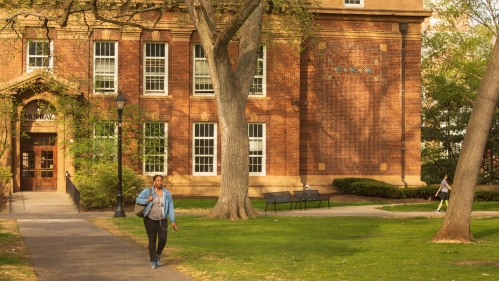
Ph.D. Curriculum
Requirements & Course Offerings
The goals of the Ph.D. Program in Social Work are to prepare students to assume positions of leadership in the field of social welfare by contributing to the knowledge base of social work and the related fields of human services as faculty, researchers, and leaders in the areas of policy and practice.
Students are expected to complete a 73 credit program including:
- a course of study with 37 to 49 credits,
- if the student holds an M.S.W. or related degree, up to 12 credits from the accredited program can be transferred into the Ph.D. program,
- research internship,
- passing grades on both sections of the qualifying examination,
- successful defense of a dissertation proposal, and
- successful defense of a dissertation (a minimum of 24 research credits while in candidacy) for 73 total credits.
The overall policy is guided by a belief in maximizing student choice with regard to areas of research. Students are encouraged and expected to make decisions concerning their elective course work, research internship, and dissertation project.
Teaching Opportunities
In the 3rd or 4th year of the program, students participate in the Teaching Assistance Project (TAP) offered by the School of Graduate Studies - New Brunswick. Four non-credit, 1-hour workshops on issues related to teaching provide students with a TAP teaching certificate, and all students are expected to participate.
Opportunities for Ph.D. students to teach in the School of Social Work (MSW or BASW programs) are typically available in the third or fourth year of enrollment.

Distribution of Ph.D. Course & Credit Requirements
The required distribution of courses is as follows:
- Theory Development (3)
- Conceptual Foundations in Social Work and Social Welfare (3)
- Social Policy Analysis (3)
- Research Methods and Statistics (18)
- Elective course (3)
- Elective course in Outside Discipline (3)
- Research Development Seminar (3)
- Professional Development Seminar (1)
- Total Course credits 37 (Plus transfer credits MSW/MA) (12)
The required distribution of research credits is as follows:
- Research Internship (3)
- Dissertation Seminar (6)
- Dissertation Research (15)
- Total Research credits 24
For incoming students, we provide a non-credit, non-graded online Statistics Review in the summer prior to entering the program. The review is self-paced and facilitated by an instructor in the doctoral program. It is meant to offer a statistics refresher prior to beginning the statistics course in the fall, and it is expected that all entering students will participate.
Students with a MSW may transfer 12 credits toward the Ph.D. upon completion of 12 credits of graduate level course work with grades of B or better. Those with another master's degree may not have as many transferable credits. In any case, 48 course credits are expected prior to the dissertation phase of the program. The Program Director will assess transferability of masters-level courses, which are then reviewed by the School of Graduate Studies - New Brunswick.

Designing a Course of Study
The distribution of Ph.D. courses includes required and elective courses. Students should plan with their advisors the choices among restricted electives, free electives, and outside discipline courses that will best build a coherent body of knowledge in the student's chosen area of interest. Students should begin to work with their advisors early in the first year to develop a focus of interest. In addition, students may wish to pursue an area in which no formal course is available. In such cases, a tutorial, called an Individual Study could be considered.
Students are assigned a faculty advisor in their first year. Students can request a change in their advisor by notifying the Ph.D. Program Director and the Program Coordinator. Our goal is to help students tailor their Ph.D. studies to fit their own goals and interests while also acquiring the knowledge and skills judged necessary for the Ph.D. degree.
The key element for planning a course of study is a focus of interest. Students should start as soon as possible to define an area of primary interest. This focus will help students to plan the courses to take, and within any given course, to apply that course content to their major interest. Readings and topics for term papers or other assignments can all address some aspect of the student's major interest.
Students are encouraged to discuss their course choices with an advisor in designing a course of study.

Outside Disciplines
All students must take at least one course in another discipline outside of Social Work. This may be done in another program in the School of Graduate Studies - New Brunswick such as Sociology, History, Anthropology, etc. It also may be done in another professional school not part of the School of Graduate Studies - New Brunswick, such as Law, Public Health, Graduate School of Applied and Professional Psychology, or Graduate School of Education. (Note: A student may take ONLY 24 CREDITS IN A PROFESSIONAL SCHOOL (outside the School of Graduate Studies - New Brunswick), and may have already used as many as 12 transfer credits from the masters degree.) Outside courses may also be arranged through the Inter-University Doctoral Consortium.
The criteria for course selection are:
- it adds central and useful knowledge, theory, or methodology to the student's developing area of interest;
- it is at the doctoral or equivalent level;
- and the student's advisor agrees that it furthers the student's educational plan.
It is possible that a faculty member teaching an outside course will become the outside member of the student's dissertation committee. The student is urged to consider taking more than one course in this outside area in order to become familiar with that discipline's way of approaching and dealing with issues. Students will need to consult with the Program Coordinator regarding registration for these courses.





